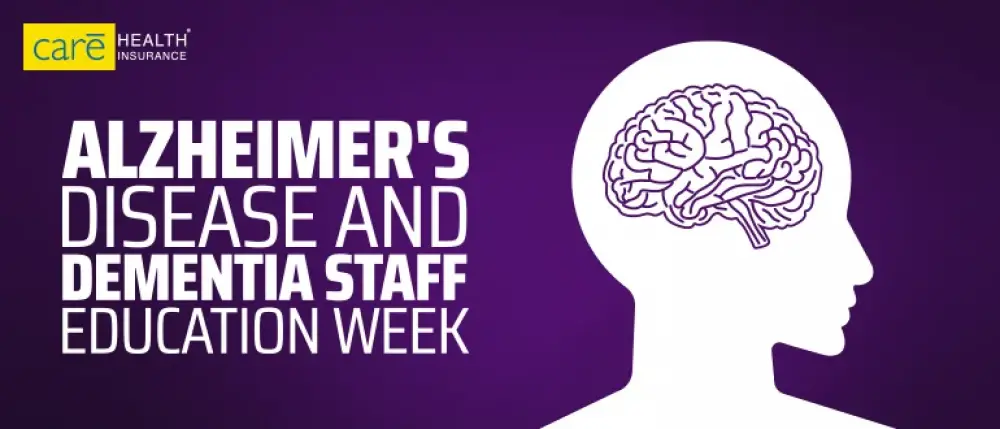Subscribe to get weekly insights
Always stay up to date with our newest articles sent direct to your inbox
Published on 11 Feb, 2025
Updated on 4 Mar, 2025
176 Views
3 min Read

Written by Farina Khan
Reviewed by Munmi Sharma
0Like
Be the First to Like
Every year, Alzheimer's Disease and Dementia Care Staff Education Week is celebrated from February 14 to 21. Healthcare providers, caregivers, and communities come together to observe this week. Each year, the National Council of Certified Dementia Practitioners promotes the observance of this week.
Alzheimer's Disease and Dementia Care Staff Education Week is observed to raise awareness about Alzheimer's disease and dementia, educate care staff, and provide essential support to those affected by these conditions. In this blog, we will explore the differences between dementia and Alzheimer's disease, the symptoms of both conditions and the latest advancements in their treatment, including stem cell therapy. Stay connected to enhance your knowledge!
The observance of Alzheimer's Disease and Dementia Care Staff Education Week was initiated to address the growing need for specialised education and training for healthcare providers and caregivers. Since its establishment, the goal has been to enhance the quality of care for individuals affected by Alzheimer's and dementia.
Since 2007, the Alzheimer's Disease and Dementia Care Staff Education Week observance has focused on raising awareness nationally and globally. Promoting best practices like face-to-face interactive sessions for healthcare professionals and caregivers. It also aims to provide resources to improve the lives of those living with these conditions and their families.
One of the major questions that arises is how one can participate in observance of the Alzheimer's Disease and Dementia Care Staff Education Week. Well, here is the answer!
Dementia and Alzheimer's Disease are the terms that are often used interchangeably, but they are not the same. Understanding the similarities and differences between dementia and Alzheimer's Disease can help provide better care and support to those affected. Here you go!
Dementia is an umbrella term that describes a range of symptoms affecting memory, thinking, and social abilities severely enough to interfere with daily life. Dementia is not a specific disease but rather a group of symptoms caused by various underlying conditions.
The symptoms of dementia can include memory loss, confusion, difficulty with communication, changes in mood and behavior, and impaired judgment. It can be caused by various factors, including Alzheimer's Disease, vascular dementia, Lewy body dementia, and frontotemporal dementia.
Alzheimer's Disease is the most common cause of dementia, accounting for 60-80% of dementia cases. It is a specific brain disease that causes the gradual loss of cognitive function and memory. Symptoms of Alzheimer's disease include memory loss, confusion, difficulty with communication, changes in mood and behavior, and impaired judgment.
The symptoms of Alzheimer's Disease and dementia can vary, but some common signs include:
Alzheimer's Disease and Dementia Care Staff Education Week is an opportunity to raise awareness about these conditions and the importance of early diagnosis and care. Caregivers, healthcare professionals, and communities are encouraged to participate in educational programs, support groups, and awareness campaigns to improve the quality of care for those affected by Alzheimer's Disease and dementia.
>> Also Read: Alzheimer's- A Fatal Disease That Damages The Brain
Disclaimer: The above information is for reference purposes only. Kindly consult your general physician for verified medical advice. The health insurance benefits are subject to policy terms and conditions. Refer to your policy documents for more information.
Be the First to Like
शुगर कंट्रोल कैसे करे? जानें, डायबिटीज में क्या खाना चाहिए Care Health Insurance in Health & Wellness
Thyroid : मामूली नहीं हैं महिलाओं में थायराइड होना, जानें इसके लक्षण और घरेलू उपचार Care Health Insurance in Diseases
हाई ब्लड प्रेशर को तुरंत कंट्रोल कैसे करें? देखें इसके उपाय Care Health Insurance in Diseases
प्लेटलेट्स की कमी के लक्षण, कारण और इलाज क्या है Care Health Insurance in Diseases
World Chagas Disease Day: Understanding Global Health Impact of Kissing Bugs Care Health Insurance in Awareness Days
World Parkinson’s Day: Raising Hope for the Elderly Care Health Insurance in Awareness Days
World Bipolar Day 2025: Understanding Bipolar Disorder and Breaking Stigma Care Health Insurance in Health Insurance Articles
ट्यूबरक्लोसिस (टीबी) के लक्षण, कारण और इलाज Care Health Insurance in Awareness Days